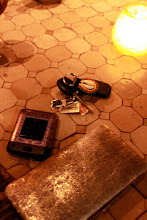I'm almost done with my pediatrics rotation, and I'm delighted to report that I continue to enjoy it. I'm on my second week of inpatient pediatrics, and so far, the experience has been good. More lessons learned:
- My dad was right all those years ago. I should have learned Spanish. It would help so much with my patients. It's not so bad when you can get a live translator to stand in the room with you and help you communicate with the patient, but using one of those translators via phone almost completely eliminates important, human interactions like eye contact. It's not easy to show a mother that you're just as concerned about her child as she is, when you're both staring down at a speakerphone and speaking into it.
- It's a good sign when your attending says that every day, rounds will begin with a cute photo of the day.
- If you ever hear doctors talking about something that sounds like "go lightly," you can bet they're not discussing an Audrey Hepburn movie.
- I eat way fewer vegetables and fruits, on a daily basis, than I should. I mostly fill up my stomach and my day with carbohydrates, which are delicious, but empty, calories. This failing was brought into sharp relief for me recently, because I had been spending a lot of time during my community pediatrics rotation encouraging overweight children to have 5 servings of fruits and vegetables daily. It's nice that my "job" helps me reflect on my lifestyle and health.
- I really, really like working in a community clinic.
- Conversely, I'm really not that wild about the inpatient setting.
- Having an attending who empowers you, as the medical student, to call consults, assist in patient education prior to discharge, and generally do much of the work of residents, is a good thing, even if it means more work. As my new, awesome attending pointed out, if we spend all of medical school carrying no more than 2 patients at once, we'll be completely out of our element when, as interns, we'll be expected to carry close to 10 at any given time. Working hard in medical school kind of sucks, but it's good practice for when your decisions really mean something, after that arbitrary moment of graduation.
- Life flies by. I just went to an information session about scheduling my last 18 months of medical school. It was both terrifying and incredibly exciting.
- It's a wonderful thing when you're doing something that makes you happy, especially when you're going through a rough patch in life. I'm so grateful I'm on Pediatrics right now, and that I'm loving it.
